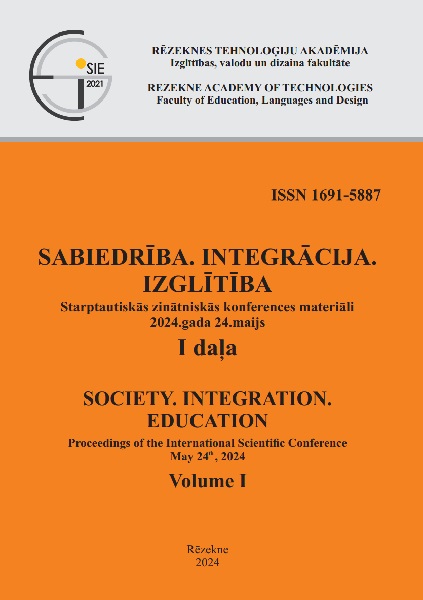MULTICULTURALISM AND INTERCULTURALISM: REALITY OR VISION IN TEACHING
DOI:
https://doi.org/10.17770/sie2024vol1.7902Keywords:
intercultural education, interculturalism, globalisation, multiculturalism, students, teaching processAbstract
Today, the increasing mobility of people, globalisation and various political and economic circumstances have created a situation in which intercultural communication issues are more often on our minds. As shown on the Official Statistics website, of the 38708 long-term migrants who arrived in Latvia in 2022, only 5214 were ethnic Latvians, while 7758 were school-age children (Latvijas oficiālā statistika, 2023). The publication examines the experience of intercultural education in Latvia to date, keeping in mind that not only in Latvia, but also globally, there are different opinions on how much attention should be paid on intercultural education issues in schools. The aim of this publication is to analyse the readiness of general education teachers of Latvia to work in multicultural classrooms using the teaching methods, which require a pedagogical approach based on a tolerant attitude towards ethnic, cultural and religious differences between the people. The main research question: how much teachers in comprehensive schools are aware of intercultural education issues and willing to use intercultural education methods in their work. The study is based on the results of a survey of teachers working in grades 1-12 in general education schools. The research results lead to the conclusion that teachers’ awareness on intercultural issues is not sufficient.
References
Baltiņš, M., Druviete, I. (2017). Ceļavējš cilvēku ciltij:Valoda sabiedrībā. R: LVA.
Banks, J.A. (2013). An introduction to multicultural education. University of Washington, Seattle.
Birzniece, B. (2023). Skolēni jauniebraucēji: izaicinājumi un perspektīvas pedagoga darbā: Society. In SOCIETY. INTEGRATION. EDUCATION. Proceedings of the International Scientific Conference, Vol. 1, pp. 655-664.
Clayton, J. (2020). International Encyclopedia of Human Geography (Second Edition). Parson.
Cohen, L., Manion, L., Morrison, K. (2006). Research Methods in Education. New York: Routledge Falmer.
Council of Europe (2008). White paper on intercultural dialogue: Living together as equals in dignity. Strasbourg: Council of Europe.
Guillén-Yparrea, N., & Ramírez-Montoya, M. S. (2023). Intercultural Competencies in Higher Education: a systematic review from 2016 to 2021. Cogent Education, 10(1), 2167360.
Hammer, M.R., Bennett, M.J., Wiseman, R. (2003). The Intercultural Development Inventory: A measure of intercultural sensitivity. International Journal of Intercultural Relations, 27(4), 421-443.
Hill, I. (2007). Multicultural and international education: Never the twain shall meet? International review of education, 53, 245-264.
Holm, G., Zilliacus, H, (2009). Multicultural Education and Intercultural Education: Is There a Difference? In M. Talib, J. Loima, H. Paavola & S Patrikainen (Eds.), Dialogues on Diversity and Global Education. Berlin: Peter Lang. Jan, H. (2017). Teacher of 21st century: Characteristics and development. Research on Humanities and Social sciences, 7(9), 50-54.
Margeviča, I. (2008). Skolotāju starpkultūru izglītība multikulturālā sabiedrībā. Rīga: Latvijas Universitāte. Pedagoģijas, psiholoģijas un mākslas fakultāte.
Laķis, P. (2000). Nacionālās kultūras identitāte un multikultūras sabiedrība. Grām.: Vēbers, E.(red.) Integrācija un etnopolitika. Latvijas Universitātes Filozofijas un socioloģijas institūts, 385, 395.
Latvijas oficiālā statistika. (2023). Starptautisko ilgtermiņa migrant dimuma un vecuma struktūra. Pieejams: https://stat.gov.lv/lv/statistikas-temas/iedzivotaji/migracija/tabulas/ibe030-starptautisko-ilgtermina-migrantu-dzimuma-un
Leeman, Y., Reid, C. (2006). Multi/intercultural education in Australia and the Netherlands. Compare: A Journal of Comparative and International Education, 36(1), 57-72.
Samusēviča, A., Iliško, Dz., & Rimšāne, I. (2010). Starpkultūru izglītības un komunikācijas aktualitātes pedagoģijā. No D.Ābele (sast.), Didaktiski metodiskais atbalsta materiāls profesionālajā izglītībā iesaistītajiem vispārizglītojošo mācību priekšmetu pedagogiem. Rīga:LU
Schmida, M., & Chu, H. (2016). Supporting secondary newcomers academic ally, socially, and emotionally. San Francisco, CA: WestEd.
Tūna, A. (2016). Kompetents pedagogs 21.gadsimtā. No D.Tankersley (sast.) Kvalitatīva pedagoģija: zināšanas praksē. Kvalitatīvas pedagoģijas principi un to īstenošanas vadlīnijas. Rīga: IIC






